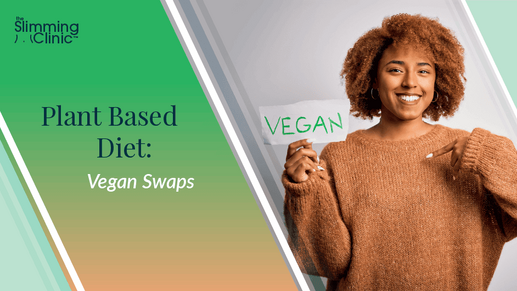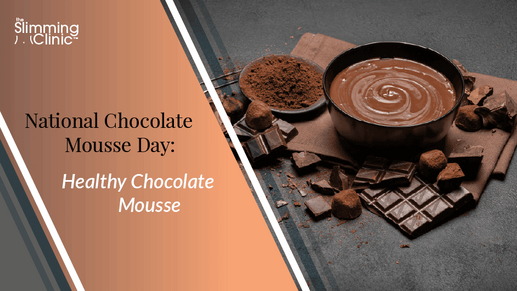The Health Benefits of Milk
Milk is a staple ingredient in our diets and lifestyle. Although we may think, as adults, that we don’t really need to incorporate as much milk into our diets as we did when we were children, milk does contain a lot of health benefits we can reap. Different types of milk each have their own benefits from being low in calories to containing a myriad of nutrients, whichever type of milk you prefer to incorporate into your diet, be sure to have some each day to ensure you’re getting the full nutritional benefits. Almond Milk Almond milk has a nutty taste and a creamy texture similar to cow’s milk, which makes almond milk a popular lactose free alternative to cow’s milk. It’s ideal for vegans and those with dairy allergies and intolerances. Almond milk doesn’t naturally contain certain minerals and so the cartons sold in the supermarket often contain added vitamin D, calcium and protein. However, almond milk contains vitamin E, which naturally occurs within it. The added vitamin D and calcium work together to help bone strength the high fat and protein contents in unsweetened almond milk in relation to the carb content doesn’t cause a spike in blood sugar, making almond milk suitable option for diabetics and those on low card diets. Almond milk tastes great in porridge, milk shakes, homemade chocolate puddings and in creamy mash potatoes. 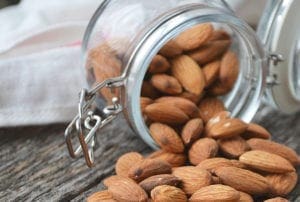 Soya Milk Soya milk is made from soy beans and is a good milk alternative for those who are lactose intolerant or vegan. It contains less sugar than cow’s milk and has about 80 calories per cup. Soya milk can help improve your blood lipid profile and contains good fats which are unsaturated and made up of 0% cholesterol. With omega 3 and omega 6 fatty acids, soya milk is also able to protect blood vessels from lesions and haemorrhage which improves the fluidity and flexibility of blood vessels so that they are more resilient to blood pressure changes. As well as being good for your health, soya milk can also be good for your figure! It contains monounsaturated fatty acid which helps inhibit intestinal absorption of fat in the body which is good for weight loss. The high fibre content in soya milk can also help you lose weight as it helps keep you feeling fuller for longer, therefore you don’t eat or snack as much. Soya milk is great for bringing out the flavour in cacao, especially in hot chocolate and smoothies.
Soya Milk Soya milk is made from soy beans and is a good milk alternative for those who are lactose intolerant or vegan. It contains less sugar than cow’s milk and has about 80 calories per cup. Soya milk can help improve your blood lipid profile and contains good fats which are unsaturated and made up of 0% cholesterol. With omega 3 and omega 6 fatty acids, soya milk is also able to protect blood vessels from lesions and haemorrhage which improves the fluidity and flexibility of blood vessels so that they are more resilient to blood pressure changes. As well as being good for your health, soya milk can also be good for your figure! It contains monounsaturated fatty acid which helps inhibit intestinal absorption of fat in the body which is good for weight loss. The high fibre content in soya milk can also help you lose weight as it helps keep you feeling fuller for longer, therefore you don’t eat or snack as much. Soya milk is great for bringing out the flavour in cacao, especially in hot chocolate and smoothies. 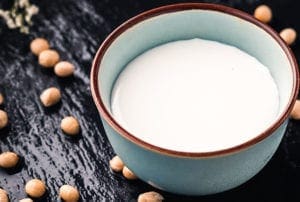 Coconut Milk Coconut milk is rich in many vitamins and minerals such as: fibre, vitamins C, E, B1, B3, B5 and B6, iron, selenium, sodium, calcium, magnesium and phosphorus as well as being lactose free! In addition to all these nutritional benefits, coconut milk also contains fat in the form of medium chain saturated fatty acids or MCFAs, which help the production of lauric acid, which, in turn is involved in processes which help the body to destroy disease causing organisms which helps to prevent the body from infections and viruses. Coconut milk is perfect for soups, curries and puddings.
Coconut Milk Coconut milk is rich in many vitamins and minerals such as: fibre, vitamins C, E, B1, B3, B5 and B6, iron, selenium, sodium, calcium, magnesium and phosphorus as well as being lactose free! In addition to all these nutritional benefits, coconut milk also contains fat in the form of medium chain saturated fatty acids or MCFAs, which help the production of lauric acid, which, in turn is involved in processes which help the body to destroy disease causing organisms which helps to prevent the body from infections and viruses. Coconut milk is perfect for soups, curries and puddings. 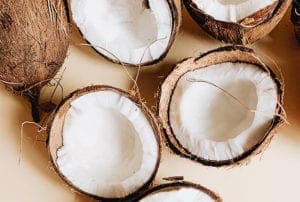 Rice Milk Rice milk isn’t as popular as the other lactose free options on the market, but does have its own benefits. Rice milk is mostly made from brown rice and is usually unsweetened. Although it is lacking in protein, its low cholesterol levels make this an ideal drink for those who are conscious about their heart health. It is often fortified with calcium, vitamin B12, A, D and iron to add more nutritional value and is the perfect ingredient for vegan pancakes and rice puddings.
Rice Milk Rice milk isn’t as popular as the other lactose free options on the market, but does have its own benefits. Rice milk is mostly made from brown rice and is usually unsweetened. Although it is lacking in protein, its low cholesterol levels make this an ideal drink for those who are conscious about their heart health. It is often fortified with calcium, vitamin B12, A, D and iron to add more nutritional value and is the perfect ingredient for vegan pancakes and rice puddings. 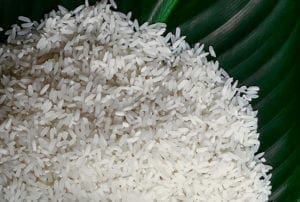 Cow’s Milk Cow’s milk is probably the most popular type of milk that is consumed and involved in our daily lifestyles and diets. The main benefit that cow’s milk boasts is that it is high in calcium which is great for healthy bones, strong teeth and preventing osteoporosis. However, there are more benefits than the calcium content in cow’s milk you can reap. The lactic acid in the milk has exfoliating properties and the enzymes in milk help to smooth your skin and the amino acids in the milk can help to keep your skin moisturised. Although milk and other dairy products have recently been dubbed as being bad for your skin, these issues will only occur if your body is sensitive to milk and can therefore be a good indication to see whether you are lactose intolerant or sensitive. Cow’s milk has also been shown to be beneficial for weight loss, as studies show that women who drink low fat milk lose more weight than those who totally exclude it from their diets.
Cow’s Milk Cow’s milk is probably the most popular type of milk that is consumed and involved in our daily lifestyles and diets. The main benefit that cow’s milk boasts is that it is high in calcium which is great for healthy bones, strong teeth and preventing osteoporosis. However, there are more benefits than the calcium content in cow’s milk you can reap. The lactic acid in the milk has exfoliating properties and the enzymes in milk help to smooth your skin and the amino acids in the milk can help to keep your skin moisturised. Although milk and other dairy products have recently been dubbed as being bad for your skin, these issues will only occur if your body is sensitive to milk and can therefore be a good indication to see whether you are lactose intolerant or sensitive. Cow’s milk has also been shown to be beneficial for weight loss, as studies show that women who drink low fat milk lose more weight than those who totally exclude it from their diets. 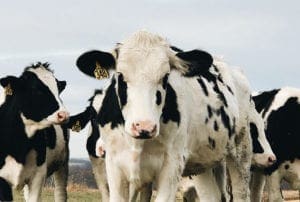 Goat’s Milk Goat’s milk is easier to digest than cow’s milk as even though they both have a similar fat content; the fat globules in goat’s milk are smaller and easier to digest. It is lower in lactose than cow’s milk which can be good for those who have trouble with digesting cow’s milk. It is richer in calcium and helps to reduce ‘good’ cholesterol levels whilst reducing the ‘bad’ ones. Its high levels of Vitamin A can help to improve complexion, fight acne and improve the overall skin health.
Goat’s Milk Goat’s milk is easier to digest than cow’s milk as even though they both have a similar fat content; the fat globules in goat’s milk are smaller and easier to digest. It is lower in lactose than cow’s milk which can be good for those who have trouble with digesting cow’s milk. It is richer in calcium and helps to reduce ‘good’ cholesterol levels whilst reducing the ‘bad’ ones. Its high levels of Vitamin A can help to improve complexion, fight acne and improve the overall skin health.  Here are some similar articles: https://theslimmingclinic.com/blog/healthy-vs-unhealthy-cheeses/ https://theslimmingclinic.com/blog/healthy-chocolate-chip-pancake-day-recipe/ https://theslimmingclinic.com/blog/healthy-pumpkin-ginger-soup-recipe/
Here are some similar articles: https://theslimmingclinic.com/blog/healthy-vs-unhealthy-cheeses/ https://theslimmingclinic.com/blog/healthy-chocolate-chip-pancake-day-recipe/ https://theslimmingclinic.com/blog/healthy-pumpkin-ginger-soup-recipe/
 Soya Milk Soya milk is made from soy beans and is a good milk alternative for those who are lactose intolerant or vegan. It contains less sugar than cow’s milk and has about 80 calories per cup. Soya milk can help improve your blood lipid profile and contains good fats which are unsaturated and made up of 0% cholesterol. With omega 3 and omega 6 fatty acids, soya milk is also able to protect blood vessels from lesions and haemorrhage which improves the fluidity and flexibility of blood vessels so that they are more resilient to blood pressure changes. As well as being good for your health, soya milk can also be good for your figure! It contains monounsaturated fatty acid which helps inhibit intestinal absorption of fat in the body which is good for weight loss. The high fibre content in soya milk can also help you lose weight as it helps keep you feeling fuller for longer, therefore you don’t eat or snack as much. Soya milk is great for bringing out the flavour in cacao, especially in hot chocolate and smoothies.
Soya Milk Soya milk is made from soy beans and is a good milk alternative for those who are lactose intolerant or vegan. It contains less sugar than cow’s milk and has about 80 calories per cup. Soya milk can help improve your blood lipid profile and contains good fats which are unsaturated and made up of 0% cholesterol. With omega 3 and omega 6 fatty acids, soya milk is also able to protect blood vessels from lesions and haemorrhage which improves the fluidity and flexibility of blood vessels so that they are more resilient to blood pressure changes. As well as being good for your health, soya milk can also be good for your figure! It contains monounsaturated fatty acid which helps inhibit intestinal absorption of fat in the body which is good for weight loss. The high fibre content in soya milk can also help you lose weight as it helps keep you feeling fuller for longer, therefore you don’t eat or snack as much. Soya milk is great for bringing out the flavour in cacao, especially in hot chocolate and smoothies.  Coconut Milk Coconut milk is rich in many vitamins and minerals such as: fibre, vitamins C, E, B1, B3, B5 and B6, iron, selenium, sodium, calcium, magnesium and phosphorus as well as being lactose free! In addition to all these nutritional benefits, coconut milk also contains fat in the form of medium chain saturated fatty acids or MCFAs, which help the production of lauric acid, which, in turn is involved in processes which help the body to destroy disease causing organisms which helps to prevent the body from infections and viruses. Coconut milk is perfect for soups, curries and puddings.
Coconut Milk Coconut milk is rich in many vitamins and minerals such as: fibre, vitamins C, E, B1, B3, B5 and B6, iron, selenium, sodium, calcium, magnesium and phosphorus as well as being lactose free! In addition to all these nutritional benefits, coconut milk also contains fat in the form of medium chain saturated fatty acids or MCFAs, which help the production of lauric acid, which, in turn is involved in processes which help the body to destroy disease causing organisms which helps to prevent the body from infections and viruses. Coconut milk is perfect for soups, curries and puddings.  Rice Milk Rice milk isn’t as popular as the other lactose free options on the market, but does have its own benefits. Rice milk is mostly made from brown rice and is usually unsweetened. Although it is lacking in protein, its low cholesterol levels make this an ideal drink for those who are conscious about their heart health. It is often fortified with calcium, vitamin B12, A, D and iron to add more nutritional value and is the perfect ingredient for vegan pancakes and rice puddings.
Rice Milk Rice milk isn’t as popular as the other lactose free options on the market, but does have its own benefits. Rice milk is mostly made from brown rice and is usually unsweetened. Although it is lacking in protein, its low cholesterol levels make this an ideal drink for those who are conscious about their heart health. It is often fortified with calcium, vitamin B12, A, D and iron to add more nutritional value and is the perfect ingredient for vegan pancakes and rice puddings.  Cow’s Milk Cow’s milk is probably the most popular type of milk that is consumed and involved in our daily lifestyles and diets. The main benefit that cow’s milk boasts is that it is high in calcium which is great for healthy bones, strong teeth and preventing osteoporosis. However, there are more benefits than the calcium content in cow’s milk you can reap. The lactic acid in the milk has exfoliating properties and the enzymes in milk help to smooth your skin and the amino acids in the milk can help to keep your skin moisturised. Although milk and other dairy products have recently been dubbed as being bad for your skin, these issues will only occur if your body is sensitive to milk and can therefore be a good indication to see whether you are lactose intolerant or sensitive. Cow’s milk has also been shown to be beneficial for weight loss, as studies show that women who drink low fat milk lose more weight than those who totally exclude it from their diets.
Cow’s Milk Cow’s milk is probably the most popular type of milk that is consumed and involved in our daily lifestyles and diets. The main benefit that cow’s milk boasts is that it is high in calcium which is great for healthy bones, strong teeth and preventing osteoporosis. However, there are more benefits than the calcium content in cow’s milk you can reap. The lactic acid in the milk has exfoliating properties and the enzymes in milk help to smooth your skin and the amino acids in the milk can help to keep your skin moisturised. Although milk and other dairy products have recently been dubbed as being bad for your skin, these issues will only occur if your body is sensitive to milk and can therefore be a good indication to see whether you are lactose intolerant or sensitive. Cow’s milk has also been shown to be beneficial for weight loss, as studies show that women who drink low fat milk lose more weight than those who totally exclude it from their diets.  Goat’s Milk Goat’s milk is easier to digest than cow’s milk as even though they both have a similar fat content; the fat globules in goat’s milk are smaller and easier to digest. It is lower in lactose than cow’s milk which can be good for those who have trouble with digesting cow’s milk. It is richer in calcium and helps to reduce ‘good’ cholesterol levels whilst reducing the ‘bad’ ones. Its high levels of Vitamin A can help to improve complexion, fight acne and improve the overall skin health.
Goat’s Milk Goat’s milk is easier to digest than cow’s milk as even though they both have a similar fat content; the fat globules in goat’s milk are smaller and easier to digest. It is lower in lactose than cow’s milk which can be good for those who have trouble with digesting cow’s milk. It is richer in calcium and helps to reduce ‘good’ cholesterol levels whilst reducing the ‘bad’ ones. Its high levels of Vitamin A can help to improve complexion, fight acne and improve the overall skin health.  Here are some similar articles: https://theslimmingclinic.com/blog/healthy-vs-unhealthy-cheeses/ https://theslimmingclinic.com/blog/healthy-chocolate-chip-pancake-day-recipe/ https://theslimmingclinic.com/blog/healthy-pumpkin-ginger-soup-recipe/
Here are some similar articles: https://theslimmingclinic.com/blog/healthy-vs-unhealthy-cheeses/ https://theslimmingclinic.com/blog/healthy-chocolate-chip-pancake-day-recipe/ https://theslimmingclinic.com/blog/healthy-pumpkin-ginger-soup-recipe/ Related posts

